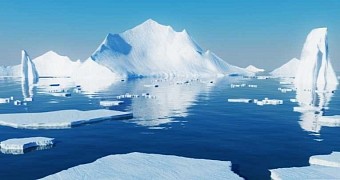Just in case anyone needed further proof that climate change and global warming are transforming the world as we know it, a new study warns that, thanks to an increase in local temperatures, an ice cap in the Arctic is now racing towards the ocean.
This might not be such a big deal if it were not for the fact that, the more of their ice cover the Arctic and the Antarctic lose, the more global sea levels stand to increase and the more damage coastal areas all across the globe are likely to experience.
How global warming is transforming the Arctic
In a paper in the journal Geophysical Research Letters, scientists with the University of Leeds say that, looking to determine how climate change and global warming are reshaping landscapes in the Arctic, they turned to data provided by satellites for help.
“New satellites, such as the Sentinel-1A and CryoSat missions, are essential for enabling us to systematically monitor ice caps and ice sheets, and to better understand these remote polar environments,” said study lead author Mal McMillan.
The researchers found that, since 2012 until now, a remote ice cap in the Arctic has grown considerably slimmer than it used to be. More precisely, the ice cap is now 50 meters (164 feet) thinner than it was just a couple of years ago. Besides, the ice cap is moving towards the ocean 25 times faster.
What's more, the University of Leeds Arctic explorers say that, over the past couple of decades, ice loss in the Svalbard archipelago's Austfonna has spread an additional 50 kilometers (roughly 31 miles inlands) inland. Besides, the ice in the area is flowing towards the ocean at a surprisingly fast pace.
This is yet to be confirmed, but evidence indicates that these changes in the behavior of Antarctic ice are due to an increase not just in surface temperatures, but also in the temperature of the ocean surrounding these remote regions.
Further investigations are in order
As mentioned, melting ice caps are a major contributor to rising sea levels. Because of this, the University of Leeds specialists recommend that further investigations into the behavior of these massive blocks of ice be carried out. The idea is to gain a better understanding of how their melting will affect global seas and oceans.
“These results provide a clear example of just how quickly ice caps can evolve, and highlight the challenges associated with making projections of their future contribution to sea level rise,” explained researcher Mal McMillan in a recent interview.

 14 DAY TRIAL //
14 DAY TRIAL //